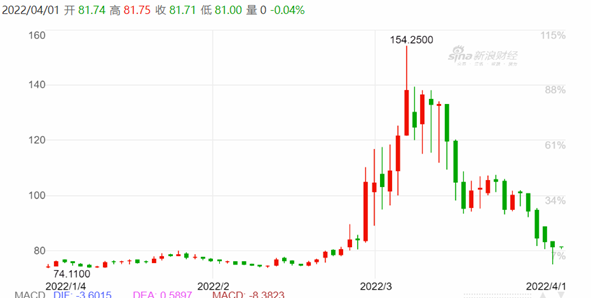As a result of the financial sanctions imposed by the West, at one point Russian financial trading had collapsed, including the RUB exchange rate. On February 23, before the war, the USD/RUB exchange rate was about 81.1370; after the sanctions, the RUB exchange rate plummeted all the way. On March 7, the USD/RUB exchange rate once traded at 154.2500, and closed at 138.2500 on the same day, depreciating by more than 70%. During a visit to Europe on March 26, U.S. President Joe Biden boasted that the USD/RUB exchange rate would fall to 200. "The ruble was almost immediately reduced to rubble," Biden said.
Sberbank decided to withdraw from the European market after its share price fell 99.99% due to the sanctions. Shares of Novatek, one of Russia's largest natural gas producers, and Lukoil also fell by 99.6% and 99.7%, respectively.
Figure: USD/RUB exchange rate since the Russia-Ukraine war


Source: Sina Finance.
However, after a period of forcible "adjustment" by Russia, all this now seems to be returning to "normal" and the ruble is starting to rebound to its normal value. After plummeting in the early days of the war and sanctions, the ruble has rebounded and is approaching its pre-war value, according to Russia's official exchange rate. By April 1, the USD/RUB exchange rate has recovered to 81.7068. It seems to be a "miracle" that Russia's financial markets, symbolized by the ruble's recovery, are gradually normalizing amid the ongoing war with Ukraine and the West's tightening sanctions.
In response to this situation, economists believe that the Russian banking system is gradually stabilizing as panic withdrawals subside. Are these economists telling the truth? How did Russia achieve all this?
Researchers at ANBOUND believe there are two aspects that cannot be ignored. One is that Russia continues to export energy abroad, with only a handful of countries such as the United States and the United Kingdom imposing sanctions on its energy exports, and American importers have significantly increased their imports of Russian oil prior to the sanctions' effective date of April 1. Supported by these exports, Russia still has a steady stream of money flowing into its system, which continues to support the country's finance. The would appear to be Western countries are undermining the sanctions themselves.
On March 23, Russian President Vladimir Putin also made a "hard move", that Russia's natural gas supplies to "unfriendly" countries (mainly European countries) will be settled in rubles rather than euros or dollars as agreed in previous contracts. On March 31, Putin signed a decree stipulating that companies from "unfriendly" countries must open ruble accounts in Russian banks and it is from these accounts that payments will be made for gas delivered starting April 1. If companies from those countries refuse to buy gas in rubles, their gas contracts will be suspended. As European countries struggle to wean themselves off Russian gas in the short term, they have to face the dilemma of whether to ease sanctions against Russia. It remains to be seen how this will be implemented, but the objective effect of pulling up the RUB exchange rate is still evident.
The second aspect is that Russia has strict financial and monetary controls. In response to Western financial sanctions, Russia's central bank temporarily halted transfers to overseas accounts by foreign legal entities and individuals in several countries and limited transfers by non-residents without an account to USD 5,000. The Bank of Russia announced that from March 28 to June 30, it will purchase domestic gold at a fixed rate of RUB 5,000 per gram of gold, stabilizing the RUB exchange rate and financial system by pegging the ruble to gold at a fixed rate. The Russian government also announced plans to buy back USD 2 billion in maturing bonds from local investors in rubles. This move was interpreted as an attempt to ease pressure on the Russian economy and financial system, but it also raised questions about the government's ability to pay.
Although the current financial measures taken by Russia are mainly in response to external financial sanctions, it is easy for Russia to maintain strict financial and monetary controls in its domestic financial markets. Under such strict controls, the Russian financial system, which is now de facto closed to the outside world, is able to avoid a collapse for the time being. As Elena Rybakova, deputy chief economist at the Institute of International Finance put it, "We were worried that a sanctions-induced bank run might lead to the failure of some of the more systemic (state-owned) banks, and that doesn't seem to have happened".
We would like to point out that what Russia is doing in the financial sector is simple but effective. Although this does not solve the substantive problems of the financial and monetary markets, it is more than enough to solve man-made problems (for example, to prevent bank runs through strict control). In fact, some problems in the financial market itself can be easily solved by adjusting market discipline and systems, and the rules of the game can be reset for traders and trading content. The Russia-Ukraine war and the West's comprehensive sanctions have actually placed Russia's finance and economy in an unprecedented "wartime" environment, in which Russia still has many ways to deal with these. It is true that the Bank of Russia managed to avert a serious financial crisis in the short term, and it worked well indeed.
Final analysis conclusion:
All in all, the long-term losses and damage to the Russian financial system due to the West's sanctions are certain. There used to be a "market" for Russia, but now there is only a "window". For the moment, this "window" is useful for Russia, its banks, and its people. However, maintaining and stabilizing the financial system with severe financial regulation can only have temporary effects. From a macro perspective, it will bring the long-term damage of being cut off from the outside world, which may last for a generation or more.
